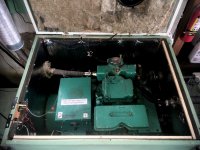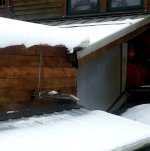. . . I could have shut down generator periodically to stretch propane, but for a few years in recent past I was laid up with surgeries. Propane supplier has never let me run dry. I plan on adding ability to use 20lb barbecue tanks in case big tank ever does run dry.
We heat our home with propane and the plan included hooking into our 500 gallon propane tank for fuel to the generator. Never would have to worry about running out of propane and shuffling smaller tanks around.




